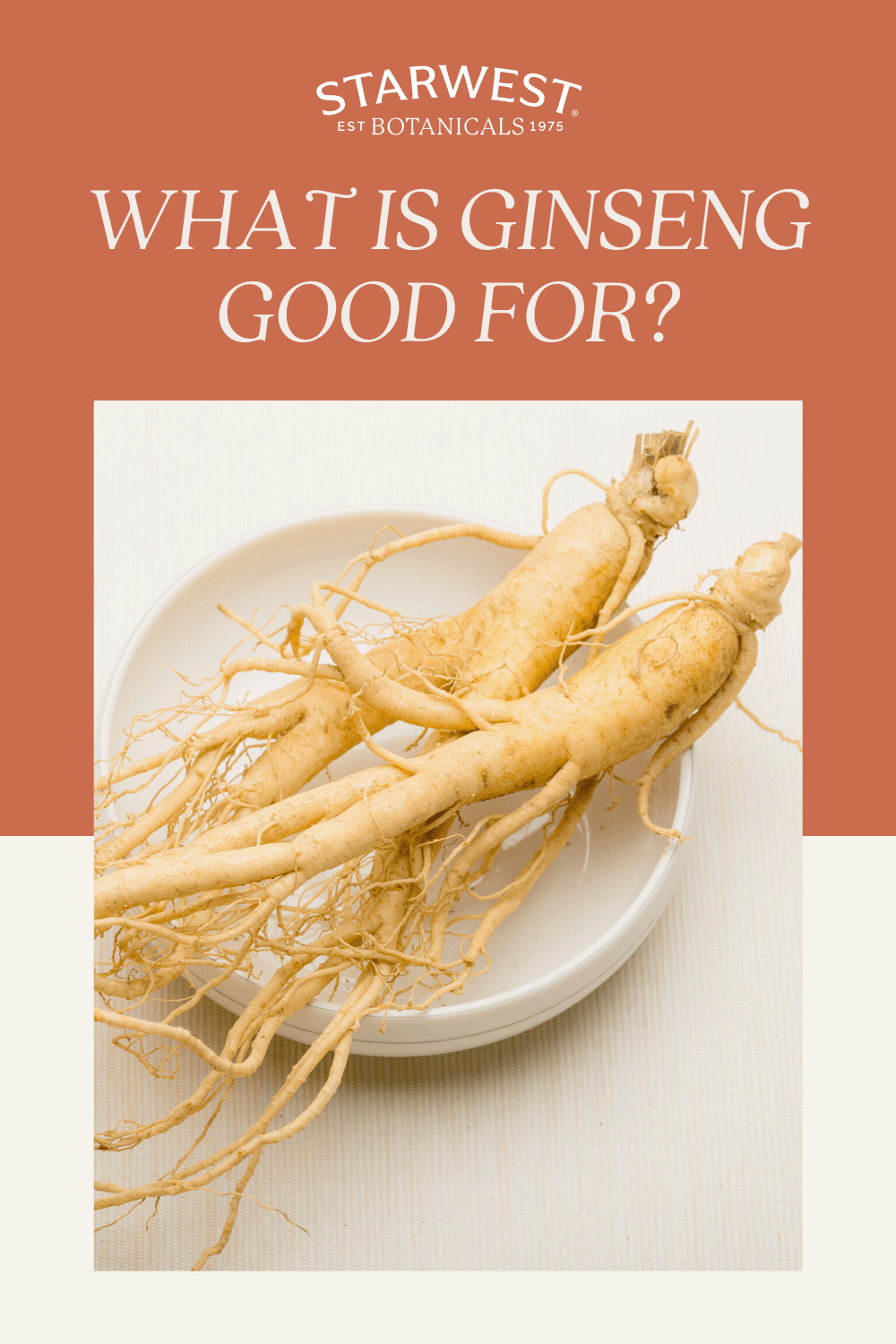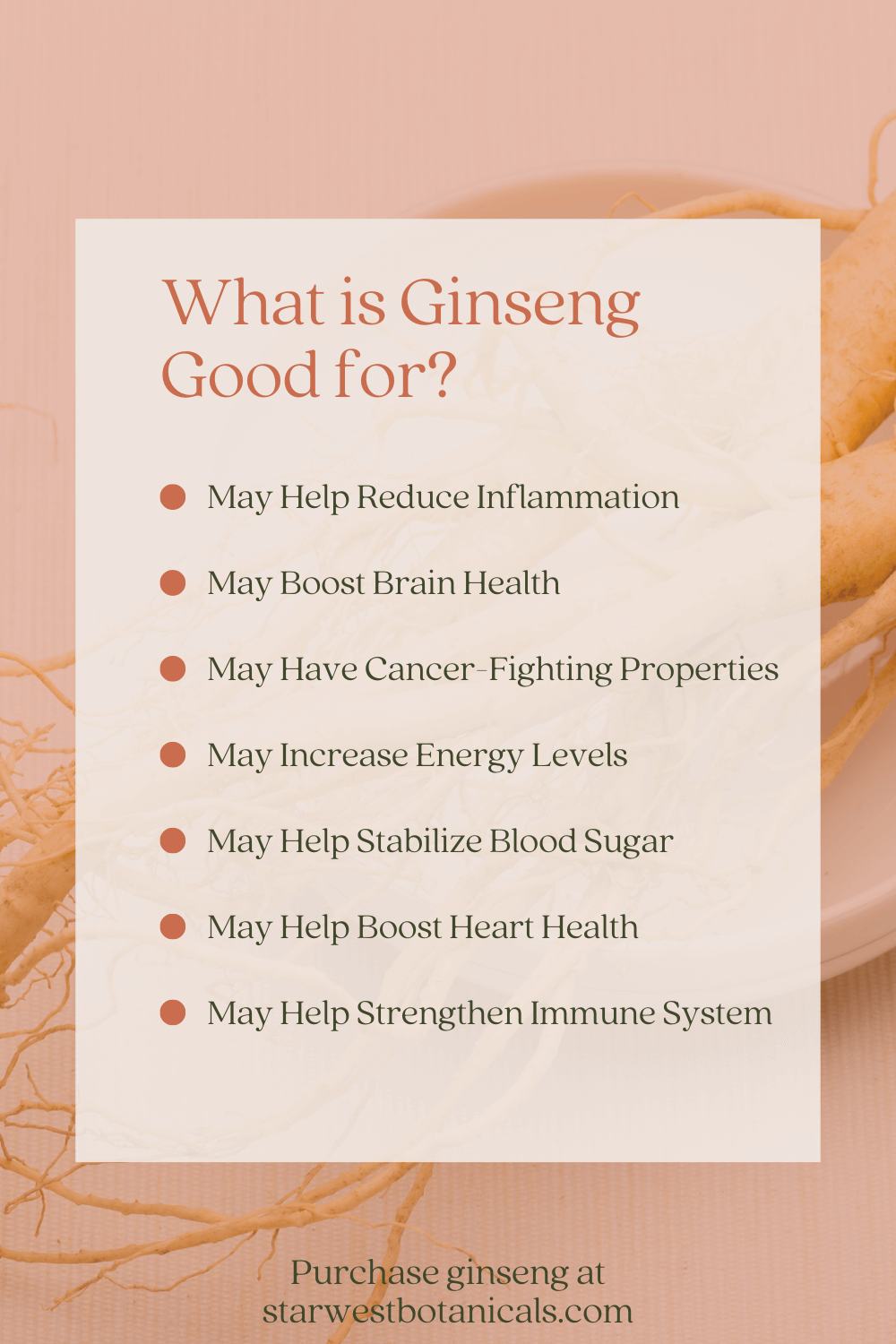What is Ginseng Good for? | Starwest Botanicals
Posted by Starwest Botanicals Content Team | Medically Reviewed by Daniel Powers, MS on 07-26-2022

One of the earliest extant records of the use of the ginseng plant as an herbal medicine comes from traditional Chinese medicine circa 196 A.D. in the Shen Nong Pharmacopoeia. This ancient text collects centuries of Chinese folk wisdom. Back then, white ginseng was used in a range of medicines to treat a variety of ailments and illnesses. It's often added to green tea or prepared together with other herbs like Ginkgo biloba.
Centuries later, people in China and all over the world still believe in the potential health benefits of ginseng. Even though more ginseng research is needed to know for sure, there is scientific evidence that supports the purported links between wellness and this special, human-shaped root.
But what is ginseng good for? What’s behind its widespread popularity and reputation as one of nature’s most potent medicinal herbs? Can it really help improve your health?
From its potential immune-boosting properties to how this wonder plant might help your brain, here’s everything you need to know about ginseng.
What is Ginseng?
Ginseng comes from certain plants in the genus of Panax, a family that includes about 60 distinct kinds of flora. That said, only a few are relevant to our discussion of ginseng, which actually refers to the root of this extraordinary plant.
You may be aware of different types of ginseng like Korean ginseng or Korean red ginseng, White ginseng, Siberian ginseng, and American ginseng. It is common for people to mistake ginseng vs ginger, as these two herbal items have a lot of similarities and benefits. It is often sold in the form of ginseng tea, ginseng extract, or ginseng supplements.
Most notably, it’s the presence of two special compounds that distinguishes ginseng from other plants in the Panax family. These compounds are also thought to be responsible for the potential health benefits people have associated with the plant for centuries. Those compounds are:
- Ginsenosides – These are a type of saponin compound that makes up most of what comprises the ginseng root. They’re also the active ingredient that’s believed to be responsible for the root’s potential medicinal applications.
- Gintonins – These are proteins in ginseng that have become glycosylated through an enzyme reaction. They also contain lysophosphatidic acids (LPAs), which are acids that interact with special proteins in your body to help send signals and messages to your cells.
Where Does Ginseng Come From?
Although ginseng once grew wild in the relatively cool climates of places like Korea, parts of China, and North America, it’s now considered "at risk" and is less commonly used commercially.
Instead, the ginseng you encounter in supermarkets and dietary supplements most likely come from cultivated ginseng. And if you check the package, you’ll see that it’s probably one of two select types of ginseng, distinguishable by the kinds and levels of ginsenosides and gintonins that each contains. Those two kinds of ginseng are:
- American ginseng – Panax quinquefolius L, or North American ginseng, comes from plants native to eastern North America. It has a tan color.
- Korean or Asian ginseng – Panax ginseng comes from plants in Korea and far-east China. It shares the humanoid shape of American ginseng, but has a red color. It's aid to be more stimulating as an herb.

Health Benefits of Ginseng
The ancient Chinese believed ginseng could prevent vomiting, increase a person’s strength, and relieve occasional anxiety. On the other side of the world, Native Americans used it to treat everything from headaches to infertility. But what is ginseng good for, really?
Before we dive into the potential health benefits of ginseng, it’s important to stress that there are no scientific studies that definitively prove ginseng’s ability to manage, treat, or cure any illness. Instead, a range of animal studies and clinical trials that include ginseng in their treatment offer evidence of what ginseng might be able to do. Here’s what to know:
#1 May Boost Your Brain Health
Some studies suggest that adding ginseng to your diet may contribute to a healthier, higher-functioning brain. The results of animal studies offer promising evidence that the ginsenoside known as compound K, as well as others, could be beneficial in protecting your brain from damage caused by free radicals, therefore improving your:
- Behavior
- Memory
- Mood
These are major benefits for those that are looking to boost their overall brain health.
#2 May Help Strengthen Your Immune System
What is ginseng good for when it comes to your immune system? What are the benefits of ginseng tea or taking it as a daily supplement?
The results of at least one study are cause for optimism. One study found that a group of individuals who were given daily doses of ginseng every day for two years, had the following improvements:
- Improved immune performance
- A reduction of subjective symptoms
#3 May Increase Energy Levels
Are you frequently fatigued or find yourself wishing for more energy? If so, ginseng may be able to help.
Ginseng may help stimulate physical energy in individuals who feel tired. One
#4 May Help Support Heart Health
Your heart could potentially reap some big benefits from introducing ginseng into your diet. And there are several reasons why.
One study proposes a link between the ongoing consumption of ginseng and a variety of factors that contribute to heart health.
If you're looking to support your heart health, consider adding ginseng to your regimen.
Stock Up On Good-For-You Ginseng from Starwest Botanicals
Ginseng is among many herbs that may offer a range of natural health benefits. At Starwest Botanicals, we’ve been connecting people just like you with all-natural herbal extracts, capsules, essential oils, and products for your skin and hair.
In 1975, we opened our first retail shop to provide quality herbal products and excellent customer service at a fair price. Now, we’re one of the largest suppliers of organic herbs in the United States.
But we don’t stop at merely supplying our community of customers with top-quality herbal products. Guided by our three-pronged philosophy of trust, transparency, and traceability, we can offer a 100% guarantee on the quality of our products. That’s why we take total control over our milling, blending, and packaging. We regularly update our quality control standards—so that you can shop confidently knowing you’re getting the highest-quality herbs available.
Ready to discover the potential health benefits of white ginseng, plus all the very best herbs, spices, dietary supplements, and teas available? Discover Starwest Botanicals today and receive free shipping on orders of $75 or more.
You can check out our full lineup of ginseng supplements here.
Sources:
Nature. Yin and Yang of Ginseng Pharmacology: Ginsenosides vs. Gintonin. https://www.nature.com/articles/aps2013100
Nature. GPCR. https://www.nature.com/scitable/topicpage/gpcr-14047471/#
National Library of Medicine. Ginseng in Traditional Herbal Prescriptions. https://www.ncbi.nlm.nih.gov/pmc/articles/PMC3659587/#
Mount Sinai. American Ginseng Information. https://www.mountsinai.org/health-library/herb/american-ginseng
Science Daily. Ginseng
https://www.sciencedaily.com/releases/2009/05/090513215410.htm
Science Direct. Ginseng Polysaccharides – An Overview. https://www.sciencedirect.com/topics/medicine-and-dentistry/ginseng-polysaccharide#
National Library of Medicine. Bioactive Oligopeptides in Dermatology: Part 1. https://pubmed.ncbi.nlm.nih.gov/22672743/
National Library of Medicine. Anti-Fatigue Activity of the Water-Soluble Polysaccharides Isolated from Panax Ginseng C.A. Meyer. https://pubmed.ncbi.nlm.nih.gov/27983571/
National Library of Medicine. Effects of ginseng on stress-related depression, anxiety, and the hypothalamic–pituitary–adrenal axis. https://www.ncbi.nlm.nih.gov/pmc/articles/PMC5628357/#
Journal of Ginseng Research. Ancient herbal therapy: A brief history of Panax ginseng. https://www.sciencedirect.com/science/article/pii/S1226845322000331



